Speaker
Description
The use of glassy carbon (GC) as a future nuclear waste storage material depends on its capability to retain all radioactive fission products found in spent nuclear fuels. Ruthenium (Ru) is one of the most important fission products in nuclear reactors. This work investigates the effects of implantation temperature and annealing on the structural evolution and migration of Ru implanted in GC. To achieve these objectives, 150 keV Ru+ was implanted into GC samples separately at room temperature (RT) and 200°C to a fluence of 1×10^16 cm^−2. Some of the as-implanted samples were annealed at two temperature regimes (from 500 to 1000°C and from 1000 to 1300°C–in steps of 100°C) for 5 h and characterized by Raman spectroscopy, X-ray diffraction (XRD), atomic force microscopy (AFM), and Rutherford backscattering spectrometry (RBS). Both Raman spectroscopy and XRD showed that implantation caused defects in the GC structures, with more defects in the RT as-implanted sample. Annealing caused the healing of both sample types but retained some radiation damage. No migration of Ru atoms was observed after annealing the as-implanted samples up to 800°C. However, a different migration behavior was seen after annealing the RT and 200°C samples from 900 to 1300°C, attributed to the aggregation, trapping and de-trapping of Ru atoms in different amounts of defect induced by implantation.
Footnotes
Implantation, Aggregation, Migration, Stress, Glassy Carbon
| Region represented | Asia |
|---|

